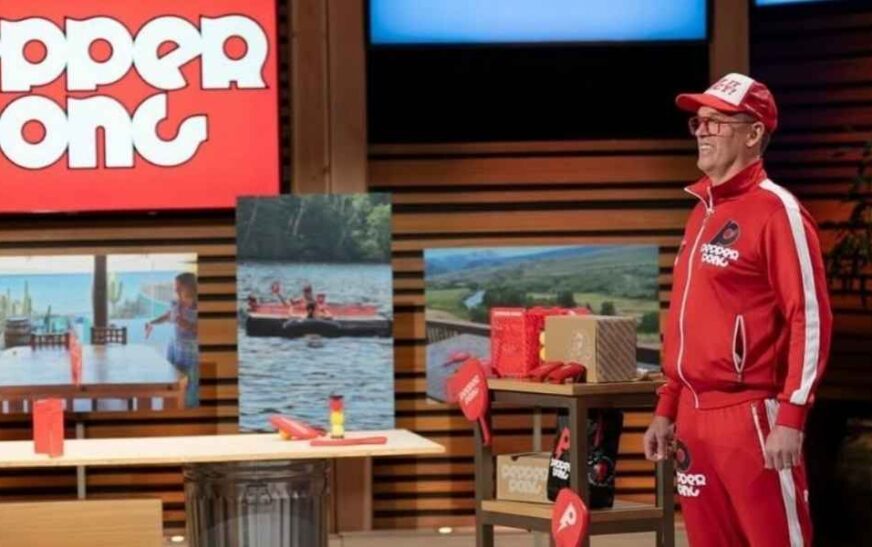Entrepreneur Tom Filippini pitched his company, Pepper Pong, in Shark Tank Season 16, Episode 06. Pepper Pong is a portable game of ping pong, also known as table tennis. This fun and portable version of the game lets you turn almost any flat surface, even the floor, into your own mini table tennis arena.
Furthermore, It’s easy to carry, quick to set up, and perfect for a fast game wherever you are. Did the entrepreneur secure a deal on Shark Tank? Check out the Pepper Pong Shark Tank update to find out!
Pepper Pong Shark Tank Pitch
- Company Name: Gnome Advent Calendar
- Founder: Jenna Hess
- Business: Countdown Advent Calendar
- Episode: Season 16, Episode 07
- Asked Deal: $45,000 for 10% equity
- Final Deal: No Deal
- Shark: No Sharks
When Tom appeared on Shark Tank, he confidently pitched his idea to the Sharks. There, he asked for $150,000 in exchange for 10% of his company. There, Tom explained that traditional ping pong had become boring and outdated. He further said that It hasn’t changed much since the 1800s.
Therefore, he wanted to bring new life to the game and make it more fun for everyone. You don’t need a big table with his version, Pepper Pong. The portable fence stretches to fit on any flat surface so you can play almost anywhere.
Tom also showed off three types of balls, each for a different level of play. The jalapeño has a soft bounce for beginners, the habanero offers a medium bounce, and the ghost pepper gives a strong bounce for more advanced players. The game is also quiet, which makes it perfect for playing inside without disturbing anyone.
While presenting his product, Tom invited the Sharks to try it out. They entered the pitch with excitement and enjoyed the hands-on demo. The idea caught their attention right away.
After that, the Sharks started asking many questions about how the business worked and how it looked behind the scenes. Kevin focused on the numbers and asked how much it cost to make one set and how much it sold for. At that moment, Tom explained that each unit sold for $70 and cost around $20 to produce.
However, Kevin was surprised by how much profit they made from each sale. He asked why the product wasn’t priced higher. In response, Tom said that he believed it could go up to $89 without hurting sales in the future.
Lori asked how much Pepper Pong had sold so far. Tom said the company brought in $260,000 in net sales during its first year and expected to make between $600,000 and $800,000 in 2024.
Mark Cuban then asked if the game was sold online. Tom explained that they only sell it through the company’s website, which lets him control how customers experience the brand. Also, over 160 people have left five-star reviews, showing that the strategy is working.
Tom also shared that he invested $500,000 into the business. Most of that money went into building molds to help produce the game parts. Right now, he has about 10,000 games left in stock. But there’s a challenge because it costs $21 to $22 to get one new customer, and most people only buy one game. That makes it harder to grow profit quickly.
Kevin pointed out the same predicament, saying most customers only buy one game, and it costs a lot to get their attention. In response to Kevin’s concern, Tom said many people buy the game as a gift, leading to repeat orders from new customers.
Guest shark Todd then asked about Tom’s personal story. Tom shared how he turned his life around after getting sober, and said that journey drove him to follow his dream and start this business.
The Sharks praised Tom for his strength and determination. Lori liked the product and suggested he take his time growing the business before spending more on another mold. However, she didn’t feel the product fit her investment style, so she stepped away.
Mark also admired Tom’s progress but worried the business relied too much on Tom’s personal story. Without a strong path for growth, he chose not to invest. Kevin also praised the product but didn’t think it could grow enough to deliver big returns, so he also decided not to invest.
Daymond was deeply moved by Tom’s story and shared his journey with sobriety. He offered $150,000 for 30% of the business, hoping to help bring the game into retail stores. But when Tom said he wasn’t ready to move into retail, Daymond respected that and returned his offer.
Then, guest Shark Todd entered the deal. He liked the game’s wide appeal and easy setup. He offered $150,000 for 25%, pointing to his background in using social media and retail to grow brands. Tom made a counteroffer at 17.5%. After some back-and-forth, they agreed on 19% equity, and Tom left the Shark Tank stage with a deal.
Summary of the Sharks’ Deal
| Shark | Offer | Counteroffer |
| Todd Graves | $150,000 for 25% equity | 01 – $150,000 for 17.5% equity 02 – $150,000 for 20% equity 03 – $150,000 for 19% equity (Accepted offer) |
| Daymond John | $150,000 for 30% equity | No |
| Mark Cuban | No | N/A |
| Kevin O’Leary | No | N/A |
| Lori Grinear | No | N/A |
What Happened to Pepper Pong after Shark Tank?
As of 2025, Pepper Pong is still in business. Since appearing on Shark Tank, Pepper Pong has grown fast. Based on current momentum, Tom seems on track to meet his 2025 goals and will likely see strong sales growth in 2025.
By May 2025, Pepper Pong had already sold over 10,000 sets, showing how quickly the game had grown in popularity. It’s especially popular in busy cities like New York, where people often don’t have enough room to play larger sports.
Big media outlets such as The New York Post, National Geographic, ABC News, and HuffPost have all featured the game, helping it reach a wide audience. Even professional athletes use Pepper Pong to improve their speed, accuracy, and movement. Well-known pickleball stars like Zane Navratil and Simone Jardim backed the game, which helped it grow even faster.
Alongside growing the brand, Tom shares his personal story through public speaking. He talks about how Pepper Pong connects to his journey of overcoming personal struggles and helping others do the same. You can purchase your own Pepper Pong and more through their website. Each game set usually sells for $99.99, but sales and special offers can bring the price down to as low as $69.99.
Pepper Pong Net Worth 2025 & Financial Overview
After the show aired, the company experienced significant sales, with an estimated growth rate of 10% per year. Based on the company’s growth rate and valuation after the Shark Tank show, Pepper Pong’s net worth is estimated at $1.16 million in 2025.
| Annual Sales Revenue | $800,000 (2024) |
| Profits | $175,000 |
| Lifetime sales | Not Available |
Pepper Pong Founder

In 2016, Tom Filippini, who lived in Denver, Colorado, made a big decision, he chose to stop drinking and take control of his life. His battle with alcohol had been tough, but he entered rehab to start fresh. The recovery process wasn’t easy. Many days, he felt lonely and hard.
One day, while walking through the facility, Tom noticed an old, broken ping-pong table. Most people would have ignored it or seen it as trash. But Tom looked at it differently. At that moment, an idea sparked.
He didn’t just see a damaged table; he saw a chance to create something positive and fun. That small moment of inspiration later grew into something meaningful and completely new. Tom then worked hard to turn his idea into reality.
In 2023, after years of dedication, Tom finished the first full Pepper Pong game set. For him, this wasn’t just a new sport but a way to help others heal, connect, and enjoy life again. Tom Filippini’s net worth is unknown as of 2025.
Conclusion
Shark Tank is a TV show that showcases different business ideas and helps them succeed. Pepper Pong was one of the ventures featured on the show. They made a deal with Todd Graves, showing that success is possible with the right idea and execution. Now, we eagerly await to see how their success story unfolds in the future.
Before you leave, check out the other company updates in Season 16, Episode 06.










